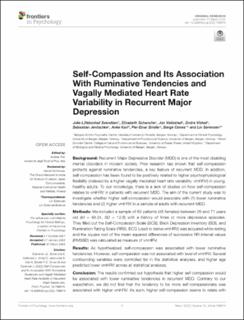| dc.contributor.author | Svendsen, Julie Lillebostad | |
| dc.contributor.author | Schanche, Elisabeth | |
| dc.contributor.author | Vøllestad, Jon | |
| dc.contributor.author | Visted, Endre | |
| dc.contributor.author | Jentschke, Sebastian | |
| dc.contributor.author | Karl, Anke | |
| dc.contributor.author | Binder, Per-Einar | |
| dc.contributor.author | Osnes, Berge | |
| dc.contributor.author | Sørensen, Lin | |
| dc.date.accessioned | 2022-04-26T11:27:06Z | |
| dc.date.available | 2022-04-26T11:27:06Z | |
| dc.date.created | 2022-04-01T13:11:02Z | |
| dc.date.issued | 2022 | |
| dc.identifier.issn | 1664-1078 | |
| dc.identifier.uri | https://hdl.handle.net/11250/2992808 | |
| dc.description.abstract | Background: Recurrent Major Depressive Disorder (MDD) is one of the most disabling mental disorders in modern society. Prior research has shown that self-compassion protects against ruminative tendencies, a key feature of recurrent MDD. In addition, self-compassion has been found to be positively related to higher psychophysiological flexibility (indexed by a higher vagally mediated heart rate variability; vmHRV) in young, healthy adults. To our knowledge, there is a lack of studies on how self-compassion relates to vmHRV in patients with recurrent MDD. The aim of the current study was to investigate whether higher self-compassion would associate with (1) lower ruminative tendencies and (2) higher vmHRV in a sample of adults with recurrent MDD.
Methods: We included a sample of 63 patients (46 females) between 20 and 71 years old (M = 40.24, SD = 12.8) with a history of three or more depressive episodes. They filled out the Self-Compassion Scale (SCS), Beck Depression Inventory (BDI), and Rumination Rating Scale (RRS). ECG (used to derive vmHRV) was acquired while resting and the square root of the mean squared differences of successive RR interval values (RMSSD) was calculated as measure of vmHRV.
Results: As hypothesized, self-compassion was associated with lower ruminative tendencies. However, self-compassion was not associated with level of vmHRV. Several confounding variables were controlled for in the statistical analyses, and higher age predicted lower vmHRV across all statistical analyses.
Conclusion: The results confirmed our hypothesis that higher self-compassion would be associated with lower ruminative tendencies in recurrent MDD. Contrary to our expectation, we did not find that the tendency to be more self-compassionate was associated with higher vmHRV. As such, higher self-compassion seems to relate with a lower tendency to ruminate about past mistakes and events but does not seem to relate to a flexible autonomic stress response (as indexed by higher vmHRV). Other potential explanatory factors for lower vmHRV in recurrent MDD is suggested as focus for exploration in future studies. | en_US |
| dc.language.iso | eng | en_US |
| dc.publisher | Frontiers | en_US |
| dc.rights | Navngivelse 4.0 Internasjonal | * |
| dc.rights.uri | http://creativecommons.org/licenses/by/4.0/deed.no | * |
| dc.title | Self-Compassion and Its Association With Ruminative Tendencies and Vagally Mediated Heart Rate Variability in Recurrent Major Depression | en_US |
| dc.type | Journal article | en_US |
| dc.type | Peer reviewed | en_US |
| dc.description.version | publishedVersion | en_US |
| dc.rights.holder | Copyright 2022 The Author(s) | en_US |
| dc.source.articlenumber | 798914 | en_US |
| cristin.ispublished | true | |
| cristin.fulltext | original | |
| cristin.qualitycode | 1 | |
| dc.identifier.doi | 10.3389/fpsyg.2022.798914 | |
| dc.identifier.cristin | 2014537 | |
| dc.source.journal | Frontiers in Psychology | en_US |
| dc.identifier.citation | Frontiers in Psychology. 2022, 13, 798914. | en_US |
| dc.source.volume | 13 | en_US |

